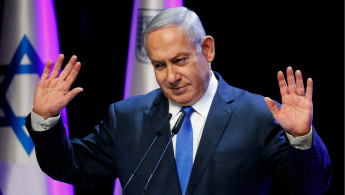Deeper underground: Netanyahu focuses on Hizballah tunnel raids amid fraud investigation
Israeli Prime Minister Binyamin Netanyahu took foreign diplomats to the border with Lebanon on Thursday, ramping up anti-Hizballah rhetoric amid a controversial military operation to destroy alleged attack tunnels.
Israel announced on Tuesday that it had discovered alleged Hizballah tunnels infiltrating its territory from Lebanon and launched an operation to destroy them, but Lebanon has disputed claims amid accusations Netanyahu is trying to distract from his legal problems.
On Wednesday, Netanyahu told UN Secretary General Antonio Guterres that "he expects the UN to strongly condemn the violation of Israel's sovereignty", according to his office's Twitter account.
"I told the ambassadors that they should condemn this aggression by Iran, Hizballah and Hamas, unequivocally, and of course also to intensify the sanctions against these elements," he said in a Hebrew-language statement on Thursday.
Netanyahu said Thursday that Hizballah, like Hamas in the Gaza Strip, was acting on behalf of its patron Iran.
"Anyone who attacks us will have bloodshed on their own heads," he said. "Hizballah knows that and Hamas knows it too."
The military said it had located one such tunnel dug from a home in the Kfar Kila area of south Lebanon that crossed into Israeli territory and was working to "neutralise" it.
Lebanon's parliament speaker Nabih Berri said on Wednesday that Israel had provided no evidence of tunnels allegedly built by Hizballah to launch cross-border attacks.
There has been no comment from Hizballah.
Distraction tactic?
Amid the much-publicised tunnel operations, Netanyahu has been condemned by opposition politicians and commentators for seeking to distract from mounting personal legal woes and a fragile political coalition.
Israeli opposition leader Tzipi Livni on Wednesday accused Netanyahu of "blowing the [tunnel] incident out of proportion".
Livni alleged that part of Netanyahu's thinking was to deflect criticism from residents of southern Israel who say he has failed to quash the threat of cross-border rocket fire from militants in the Gaza Strip.
"Therefore he made a defensive engineering event into a dramatic military operation," she said, giving two possible reasons for such a move.
"Either the prime minister is himself panicking or he wants to sow panic to justify his actions both in delaying elections and abandoning the residents of southern Israel."
Netanyahu's electoral appeal rests to a large extent on his image as Israel's "Mr Security".
The Israeli leader is seeking to hold his governing coalition together after last month's resignation of defence minister Avigdor Lieberman over a controversial Gaza ceasefire, which left him clinging to a one-seat majority in parliament.
The prime minister took over the defence portfolio after Lieberman's resignation.
He has also faced mounting legal woes, with police on Sunday recommending that he and his wife Sara be indicted for bribery, the third such decision against the premier in recent months.
Agencies contributed to this report.





 Follow the Middle East's top stories in English at The New Arab on Google News
Follow the Middle East's top stories in English at The New Arab on Google News


